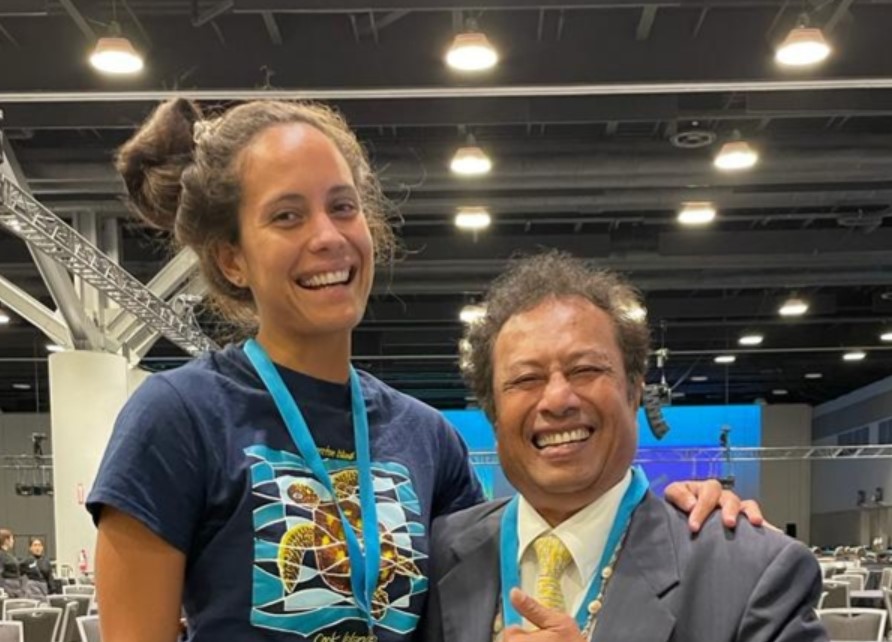Making a global ocean impact
Saturday 18 February 2023 | Written by Te Ipukarea Society | Published in Environment, National

The 5th International Marine Protected Areas Congress held in Vancouver had keynote speaker former president of Palau chief Tommy Remengesau who is globally recognised champion in ocean conservation. He is pictured with Te Ipukarea Society’s Alanna Smith. TIS/23021703
The 5th International Marine Protected Areas Congress held in Vancouver Canada has provided an important global networking opportunity for nations to learn from one another about the challenges and success stories that come with establishing a Marine Protected Area (MPA). In addition, an important theme for this year’s congress has been a focus on indigenous leadership in ocean conservation.
Indigenous voices have been particularly amplified around the issue of mining. For Canada, the First Nations people have raised concerns about terrestrial mining causing sedimentation issues in neighbouring rivers, impacting the quality of water that houses aquatic resources and species from salmon to herds of orcas migrating close by.
The Pacific has also been vocal on the issue of deep sea mining. A deep sea mining protest marched through the busy city to the headquarters of Deep Sea Mining start up company ‘The Metals Company’, which has been active in Tonga, Nauru and Kiribati. The protest march received great representation from the Pacific with supporters coming from Tahiti, Noumea, New Zealand, Hawaii, Palau, Fiji, Federated States of Micronesia, Rapa Nui, Papua New Guinea and the Cook Islands.
The conference also provided an opportunity for a sneak preview of the soon to be released ‘Deep Rising’ documentary narrated by Jason Momoa of Aquaman fame. The documentary is a call to urgency and speaks about our vital relationship with the deep ocean and how it helps sustain life on earth. It also investigates the activities of start up mining companies pursuing public favour and permission from the International Seabed Authority to start mining on the Pacific Ocean Floor.
A powerful panel discussion also discussed in depth (no pun intended) community challenges associated with transparency of information, the evolution of technology and the economics of deep sea mining. Here, a case study from the Solwara Warriors NGO group in Papua New Guinea talked about the difficulties in obtaining information from their government and sharing this with grassroot communities. The Blue Climate Initiative spoke about how technology is advancing at such a rapid pace that we won’t need the mined nodules within the next seven years, as more non-extractive and recycling solutions will be in place. A professor of ocean and fisheries economics, Ussif Sumaila, spoke about how the net value of fish, which can last forever, should be seen as a trust we invest in rather than investing in non-renewable nodules that cannot regrow. Renowned marine biologist Sylvia Earle spoke about the irreversible environmental damage that comes with deep sea mining and questioned why we are the ones having a say on the matter when our children still to come have no opportunity to comment.
Former president of Palau, chief Tommy Remengesau, globally recognised for his efforts on the protection and conservation of Palau’s natural resources, also spoke strongly against deep sea mining. Being a local fisherman at heart, he fears mining will have an impact on fisheries as “everything is interconnected from top to bottom”. During Tommy’s presidential years, Palau was able to establish an effective sustainable eco-tourism industry so Palau did not have to rely on commercial industries operating within their blue economy.
As of 2022, three seabed mining companies have approved exploration licenses to collect data and samples in Cook Islands waters. The exploration licenses which last for five years allow companies to collect commercial data on nodule densities and quality, and are required to collect environmental data to assess in five years’ time whether commercial mining can occur in a sustainable way. No commercial deep sea mining has occurred anywhere in the world to date, but we believe that, after spending hundreds of millions of dollars on exploring, there is a strong expectation from these exploration companies that they will be given a licence to mine.














































